Interest in the Greene County Schools board election is high as evidenced by the more than 80 voters who attended a candidate forum hosted by the Greene County Education Association Oct. 18.
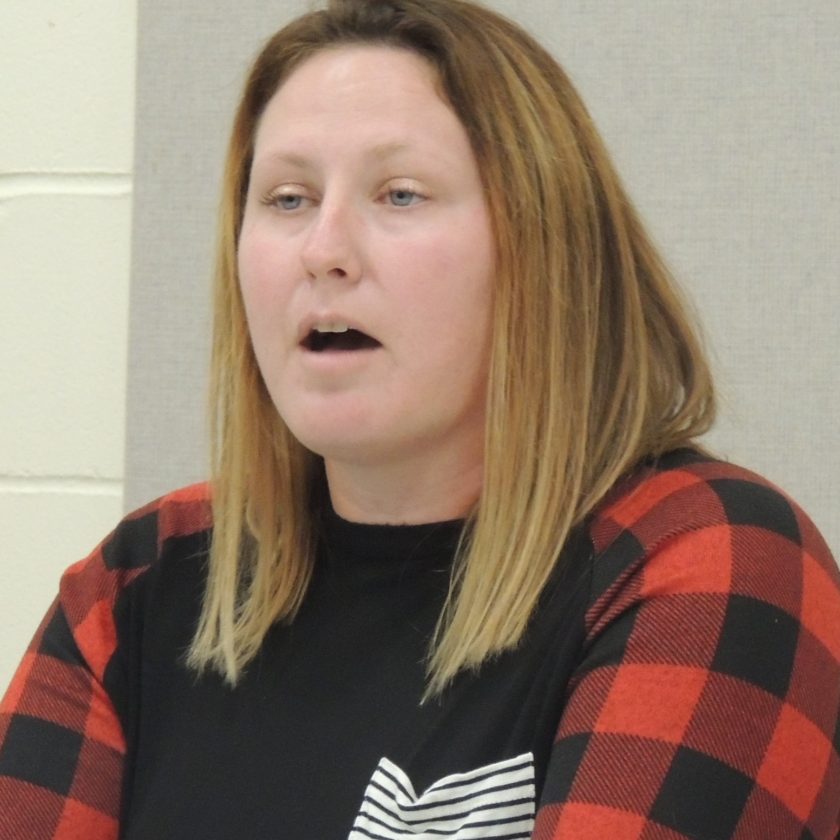
Six candidates are running for three seats on the board. Candidates are Cindy Daubendiek, Michelle Fields, Nick Lehman, Sean Sebourn, Bonnie Silbaugh, and incumbent Catherine Wilson. Board member Mike Dennhardt and board president Dr Steve Karber are not running for re-election. Board members serve four-year terms.
Rick Morain served as moderator. He invited candidates to introduce themselves and explain their reasons for running.
Bonnie Silbaugh spoke first. She and her husband Michael have three children, one in each of the district’s three buildings. She is a life-long Jefferson resident, a 2004 Jefferson-Scranton graduate and owner of Fudge’s Flower Shop. She said she’s running because she wants to learn more about all the school-related things her children are involved in.
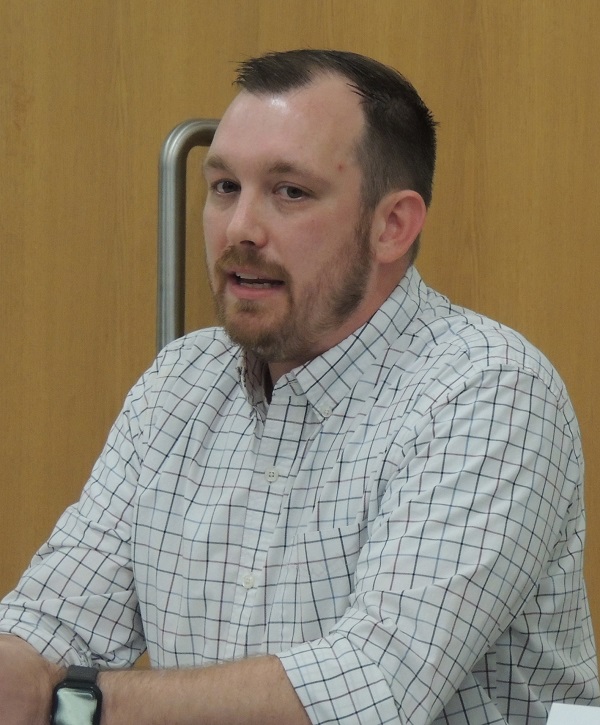
Sean Sebourn has lived in Jefferson since 1996. He attended elementary school on the east side of Des Moines. He said he was glad to move to a smaller district with more support from teachers and guidance counselors. He spent four years in Italy after graduating from J-S in 2003, and then returned to Jefferson. He has a son in seventh grade, a daughter in sixth grade, and he and his wife Miranda are expecting a daughter in January. He said he’s running for school board “to be a voice for our teachers, our students, and the parents of our community, and to be able to learn and listen to the needs of the community and the staff of Greene County.”
He wants to find ways to keep students involved and help them learn hard work, accountability, and respect.
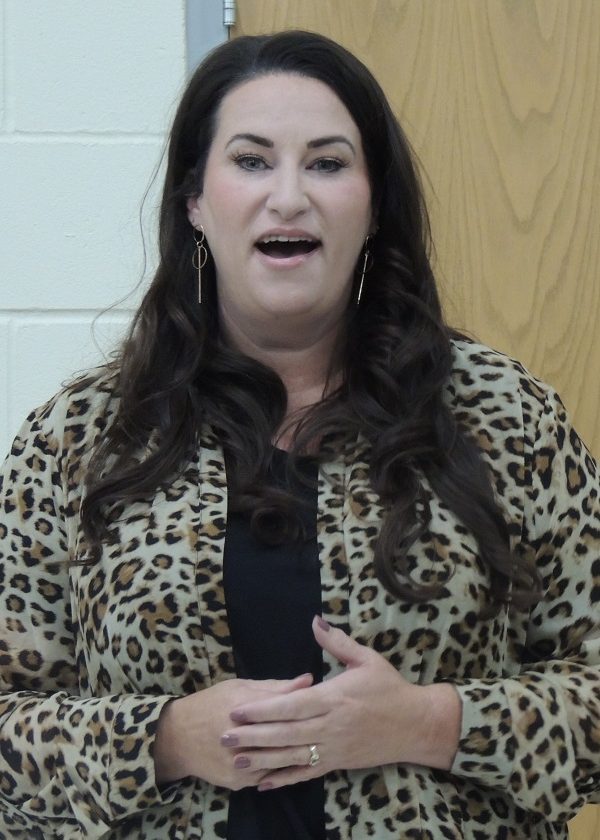
Catherine Wilson was born and raised in Jefferson. She owns Catherine’s Hairem and is a cosmetologist. She and her husband have two children who graduated from Greene County and a son in high school. During her four years on the school board she served on the district’s wellness committee, looking at the social, mental and physical wellness of students and staff.
She’s running because “it feels like four years is just not enough. You’re just figuring out. That’s why I want to stay. I think it’s important to be a servant, to be someone who’s willing to contribute to the society you’re in.”
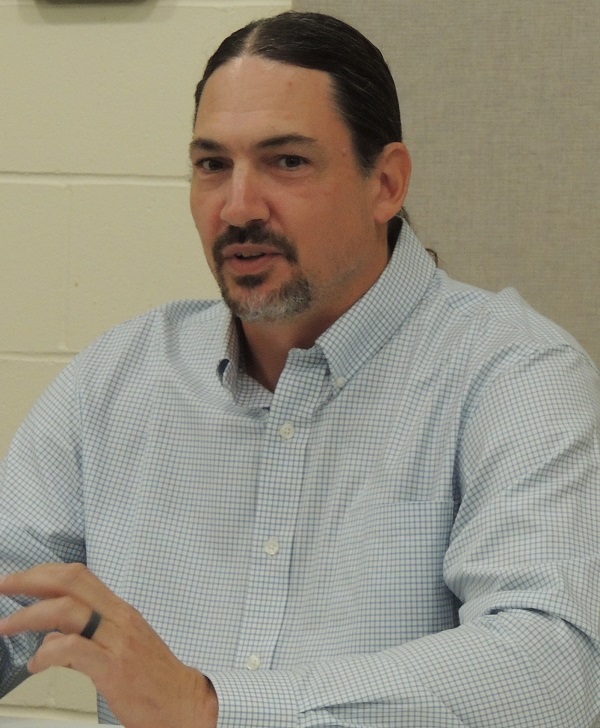
Nick Lehman graduated from East Greene Schools in 1992 and is a life-long resident of Greene County. He and his wife Lindy have a son in high school and a son at the middle school. He said he wants “to do something for the community, to give back… and see if there are some things that a new perspective could bring some new ideas to the table.”
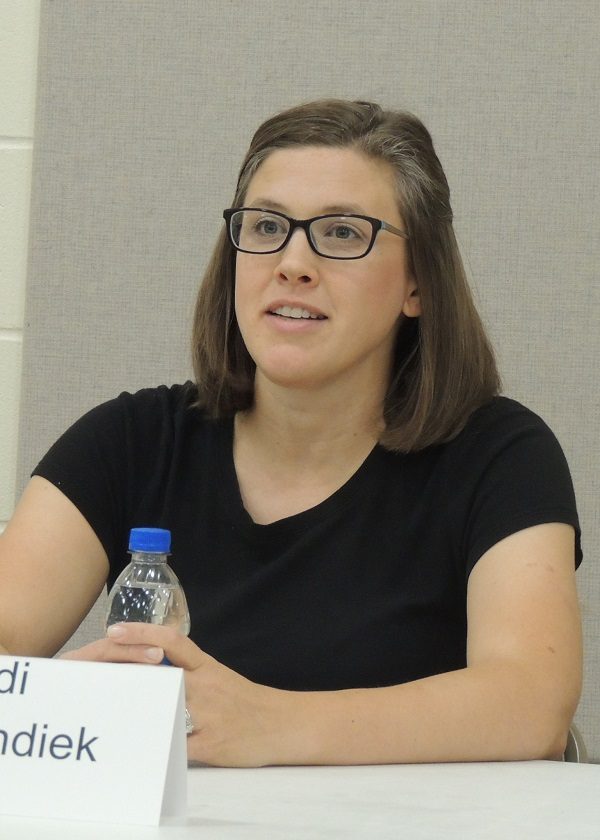
Cindi Daubendiek graduated from high school in Winona, MN, a town of 30,000 people, and moved to Jefferson in 2009. She and her husband Jamie have four children, ages 10, 8, 6 and 4. She has a degree in nursing. “I have a vested interest in my children’s education and also the kids of Greene County. We have a stake here. This is our home. This is where we chose to be. I want to do what I can to support the community, the teachers, the administration, students, all staff,” she said.
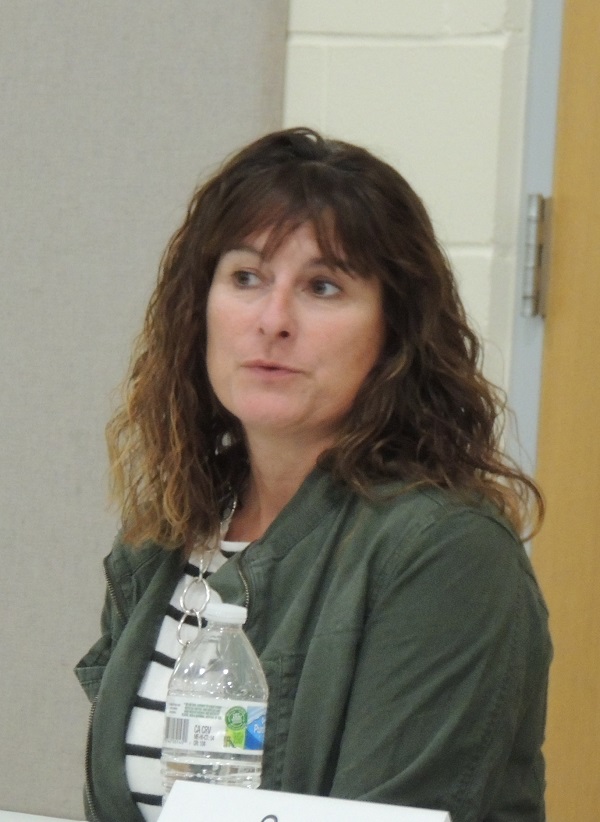
Michelle Fields grew up in Springville and moved to Jefferson in 2001. She attended college at the University of Northern Iowa and graduated from Iowa State University with a degree in fisheries and wildlife biology. She is the IT manager and GIS coordinator for Greene County. She and her husband, the late Pat Fields, have two daughters, both in high school. She is on the Greene County Early Learning Center board and the district’s School Improvement Advisory Committee (SIAC). She wants to be on the school board to give teachers the support they need to meet the goals set by the SIAC to set an example for her daughters of “giving back.”
Cindy Wise asked the first question, asking the candidates about HF 802, which was signed by Gov Reynolds during the summer. The bill prohibits the teaching of divisive concepts like Critical Race Theory. “What is your position regarding students being taught divisive concepts through such instruction as defined in Critical Race Theory?” Wise asked.
Daubendiek said Greene County is a “bubble.” “You have to actively seek out diversity, actively encourage learning about other cultures, other ethnicities, other backgrounds. That to me makes a person whole…. We don’t have a huge diverse population, but we need to teach children how to encounter and respect others, to see where they’re coming from,” she said.
Wilson said it’s important to know what Critical Race Theory is, and said she didn’t think anyone there really knows what it is. “The important thing is that as a school district we look into what that really looks like. Our school has done pretty well in teaching diversity… But when it comes to Critical Race, it’s pretty divisive if you look into what it is. It’s not about teaching diversity. It’s not about ethnicity. It’s basically saying white people are bad. We need to be cautious about what we want taught in our schools. I think talking about racism is important because it still happens,” Wilson said.
She said that during discussion of board goals, being more knowledgeable about what’s being taught in classrooms was mentioned. She said students need to feel equally important, whether they’re White, Black or Hispanic.
Silbaugh said the best way to know what’s being taught is to ask teachers. “I don’t like it being mandated, telling teachers what to say, but they’re probably doing a pretty good job already. Knowing what’s going on is the main thing, and communicating with the community is something the board is trying to work on,” she said.
Fields pointed out that “calling CRT divisive puts people on two different sides. It doesn’t have to be. We need more conversation with the teachers and the school board and parents that have concerns, as a way of not finding something to argue about, but something we work together to make sure we being as inclusive a possible and that we are following state guidelines as we’re directed to do.”
Sebourn said the school shouldn’t teach CRT, but that parents should educate their children on respect and loving one another. “I think we need to honor what the governor has proclaimed, and any governor, because they’re elected officials. As a school board, we should be empowered with making adjustments if necessary. As a county, we have values, and that is honor and respect.”
Lehman said “we can’t avoid that Critical Race Theory is being taught, but we need to teach what it is and why it’s being taught in other places, even if we aren’t teaching it ourselves. People feel this is important to be taught. To completely ignore it’s out there is not the best way to go about it, but maybe to say ‘this is what other people think, what other people do.’ It’s more of a current events curriculum than it is a history curriculum…. If we’re engaging as parents as we should, and not relying on the faculty to raise our kids for us, then this isn’t that big of a problem.”
The next question came from Donna Sutton, a retired public health nurse. She asked about mandating Covid-19 vaccines for children to attend school.
Sebourn and Wilson said parents should be able to decide whether their children should have vaccines. Silbaugh said her children will receive vaccines when they’re eligible, but she would not favor a district mandate.
Fields, Daubendiek and Lehman said they would rely on the recommendations of experts. Daubendiek said she would support Covid-19 vaccines being required just like other immunizations are required for kindergarten attendance.
Omega Sang asked candidates if they would like to see a gender identity curriculum in the Greene County Schools, if there were such a curriculum, should parental consent be required. She explained her question included transgender issues and sexual orientation.
Silbaugh said gender identity “and all of that” is a conversation parents should have at home with their children. “I think our teachers are already asked to teach so much, how could we add something so in depth to their plate,” she said. “Kids should learn about it, but not at school.”
Fields said high school students are already having conversations. She said that she’s unsure of how gender identity would work into a curriculum, but that when teachers overhear conversations they should work to keep the conversation positive.
Daubendiek said teachers should be given support in how to respond to student conversations and questions. “We need to be an ally for the teacher, because they might get the question kids won’t ask their parents… We have to make sure the teacher is comfortable in dealing with gender issues.”
Wilson said that in her heart and her mind, “every child is cherished…. We have in place people to help kids. We have two guidance counselors in every school. I don’t think it’s appropriate for a science teacher to talk about gender variety. I don’t think it’s appropriate for a math teacher to talk about it. I think our guidance counselors are educated and trained. Let’s let them do their job,” she said.
Sebourn said there’s no need for a specific class on gender identity. He said his middle schoolers have asked at home and they’ve had conversations.
Lehman said gender identity isn’t an educational matter, but something people need guidance with.
The local Education Association asked candidates to name what they see as the current challenges facing education and school boards.
Fields said that abusive, aggressive demonstrations against school boards as seen in televised news is a challenge. She said the bigger challenge is maintaining good relationships between children and their parents, and between teachers and parents. “If there’s a challenge for the school system, it’s getting more parental interaction… not just from those (parents) who show up, but from those who don’t.”
According to Lehman, social media and the use of personal electronics in a classroom can be problematic. He said that even with the school-provided Chromebooks, students can become disengaged with what’s happening in a classroom. “I think we need to figure out a way we can make sure students are engaged in the classroom, with the task at hand, and handle that in a way that’s not disrespectful for the student but helps them do better in the classroom.”
Wilson said enrollment is always a challenge because of how it affects revenue for the district. She said the school should continue to work on students’ mental health and on good relationships between students and teachers.
Sebourn agreed with Wilson. He said hiring good teacher associates should be a priority, and that higher pay would attract better associates.
Daubendiek said she doesn’t understand the policy of removing all children from a classroom when one child’s behavior becomes extreme. She said she needed to learn more about it.
Silbaugh said communication is a challenge. She said with children in three buildings, there are five different apps she needs to watch to keep informed. She said she can understand how parents become disconnected.
She’s also concerned about large class sizes, with 25-27 students in kindergarten classes. She’d like to see smaller classes, at least in kindergarten.
Chris Henning asked how the school and community should deal with homes and communities that do not have broadband internet access.
Fields said the state is working on expanding broadband access, and that hotspots are available.
Wilson said the district handled the issue of connectivity when all classes were taught virtually for two weeks last November. She said students could take hotspots home with them so their Chromebook would use a cellular connection.
“I think our community and the people that are in that business are doing a great job making sure it’s (broadband) is getting out there. Unfortunately, not every family can afford internet. We’re at 39 percent poverty level, so not every kid can afford it…. But there’s still the telephone. If you need to get in contact with somebody, you use the phone. Even people that are in a lower income still have their cell phones. And we still send mail,” Wilson said. “We do have the capability to make sure that if we ever have to go virtual again, God forbid, they have the internet at home.”
Bill Allen asked if there are plans to build new athletic facilities, noting that property taxes have increased due to construction of the new high school and work at the middle school. Wilson answered that new facilities “is a dream, but not in our plans at this time.”
Karen Lawton invited board members to briefly state what differentiates them from each other.
Fields said she has a unique perspective as a single parent, and the only parent of children who open enrolled into Greene County schools from Paton-Churdan until moving into the district two years ago. She said that when she built a new home, the first priority was that it be in the Greene County district.
Sebourn said he is “bold” in his beliefs, and he loves to hear what people say so he can learn and try to educate himself on what they’re trying to tell him.
Silbaugh said she would be a good fit for the current board and the future board because she’s a good communicator. “I’m approachable to a lot of different people,” she said. She worked as an associate for a brief time and would have that perspective as well as that of a parent.
Lehman said he tends to be “more into the arts, the educational portion of stuff as far as music and band. I enjoy that and my kids enjoy that, and that’s where I’m hoping I can focus some of the school’s energy a little more, towards that kind of education.”
Daubendiek shared that she grew up with a learning disability, that she struggled and learned to research and work at learning. “I’m one that will go out and research, go into schools, talk to teachers, see what teachers are doing. If you’re not observing and in the environment, you can’t effectively make decisions about it.”
Wilson said having four years of experience on the school board separates her from the other candidates. “It’s tricky being on the school board. You think you know it all when you get on there, what you want to change and how you’re going to do it. Then you realize the government steps in and things can only be done certain ways and that there’s rules and laws we all have to abide by.
“It’s been such a pleasure. I’ve enjoyed it so much. I’m thankful for the relationships that I’ve built, and I love it that everyone here wants to go into the schools…. No matter what happens, I want to thank you guys for allowing me for the last four years to be on your school board.”
